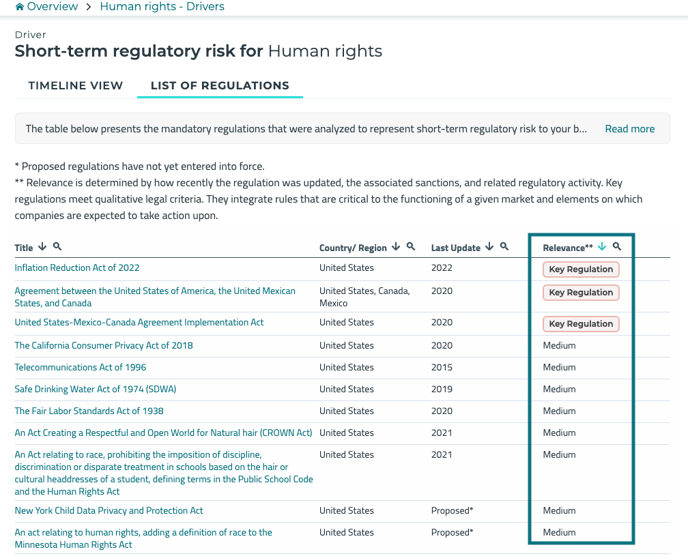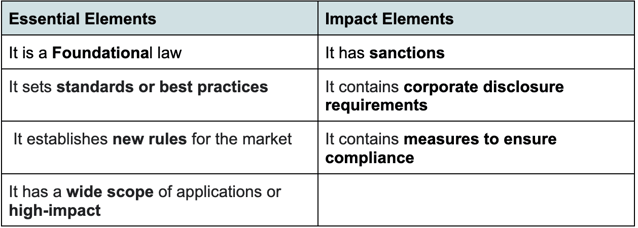Understanding the Relevance Column in Short Term Regulatory Risk
[Executive Dashboard module]
The relevance column helps you identify what to prioritize in your ESG compliance strategy.

What is a key regulation?
A regulation or initiative is marked as a 'Key' when it meets a defined number of “essential” and “impact” elements. This classification considers legal, commercial, and ESG elements.
‘Essential' elements refer to fundamental components or characteristics of a law that are necessary for its existence or functioning. These elements typically form the backbone of the legal framework.
‘Impact' elements denote aspects of a law that have significant consequences or effects, particularly on various stakeholders or the broader market.
The mandatory regulations should meet two (2) impact elements and one (1) essential element.
The voluntary regulations should meet one (1) impact element and one (1) essential element.

Why are ‘Key Regulations’ important for my business?
Key regulations are important for companies because they directly affect how businesses operate and what they need to do. They establish companies' rights and responsibilities, providing a clear framework for compliance, transparency, and accountability. These regulations significantly impact day-to-day operations and can be really important to pay attention to. Sorting them into different categories helps to focus on the most crucial ones that need immediate attention.
The Key Regulation tag allows you to identify and flag critical regulations regarding identified risks or material topics.
The High, Medium, or Low relevance is a combination of different factors:
- How recent the regulation is: to this extent, a high score is given to proposed regulations introduced within the last six months, followed by proposed regulations introduced within 6 to 12 months; active regulations enacted in the previous 12 months, and finally, all the rest of active regulations. This is because recent regulations more likely represent a new or emerging risk to our clients; therefore, they need to draw their attention to them, assuming older regulatory developments are already taken into consideration.
- Regulations with penalties or sanctions have a higher score than the ones with no penalties as there is an evident compliance risk associated.
- The related regulatory activity is the number of regulations linked to the specific initiative in our database. The more links a regulation has, the higher the score, as this indicates the broad scope of application or high impact on the regulatory activity associated with the initiative.
Datamaran considers proposed regulations as relevant because they represent emerging risks that companies need to be prepared for.
How best to find specific ‘Key Regulations’ on the Regulatory Search module?
To find specific 'Key Regulations,' we recommend copying and pasting the full title or name of the regulation or using the common name of the regulation. For example, using the Corporate Sustainability Reporting Directive or CSRD.